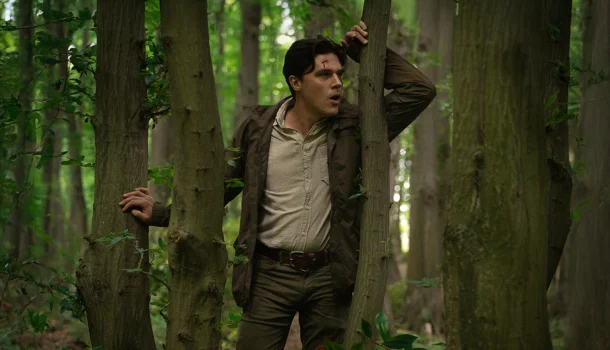Some people don’t seek reason because they deem it useless; others because they’ve mastered the art of weaponizing it for personal gain — even if that means turning life into a battlefield. But even more misguided is the one who believes such people might one day act with coherence. Human existence is a closed circuit of private anguish that reveals itself only to the one who endures it, often as torment, and only later — if at all — transforms into insight. What happens in that in-between can’t be shared or named, as it belongs solely to the one bleeding in silence, hidden among those who envy and those who pity them.
It’s in this emotional underworld that “Don’t Move” unfolds, a film that draws its tension from a particular kind of vulnerability: the aftermath of losing everything and no longer caring about what comes next. The protagonist, consumed by grief that finds no release, is pulled into a space where mourning no longer serves healing, but rather becomes a mechanism of self-erasure. Directed by Brian Netto and Adam Schindler — a duo born from shared adolescence in Minnesota and sharpened under the bright skies of Los Angeles — the film converts despair into atmosphere. Their earlier works, “Delivery” and “Intruders”, echo here in a more refined, though equally haunting, form.
The story begins with an act of finality: a woman climbing to a cliff’s edge, resolved to end her suffering by surrendering to the void. But instead of death, she meets a stranger whose gentle demeanor quickly unravels into something far more sinister. This subversion of expectation would be disturbing enough on its own, yet the script by T.J. Cimfel and David White refuses the easy thrill. Instead, it builds a meticulous psychological duel, evocative of Dostoevsky’s nihilism, in which salvation and ruin grow so close they become indistinguishable.
Portrayed by Kelsey Absille, the central figure defies convention — she hovers between the urge to disappear and the instinct to endure, resisting the familiar molds often cast upon women in thrillers. Her adversary, played by Finn Wittrock, transcends villainy in the traditional sense; he embodies the quiet cruelty that doesn’t roar but whispers, that doesn’t intimidate but seduces. The chemistry between them sustains the film’s tension, even as the dramatic arc falls back on recognizable patterns. Yet, this predictability doesn’t weaken the narrative — it only proves that horror doesn’t need novelty to be effective.
What the film ultimately lays bare is the collapse of all order when one loses their footing. Iris’s fragility, her initial surrender to the abyss, and her subsequent fight not to be consumed by it, form an unintentional yet resonant allegory of the human condition. There’s no full redemption or spotless justice — only the relentless will to keep moving, even under threat. And it’s precisely in this ambiguous territory, between falling and resisting, that the film digs in, compelling the viewer to confront the most persistent terror of all: the one that grows from within.
Film: Don’t Move
Director: Brian Netto and Adam Schindler
Year: 2024
Genres: Horror/Thriller
Rating: 8/10

